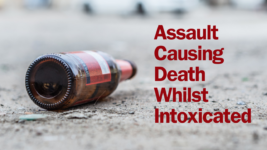The Offence of Assault Causing Death Whilst Intoxicated in NSW

A New South Wales man has been charged with assault causing death over the death of a security guard outside Royal Hotel at Sutherland in Sydney’s south.
The 30-year old security guard, who had moved from Saudi Arabia to Australia to work and study, is alleged to have been attacked at around 2am on Sunday morning by Peakhurst man, Brian Edmund Brown, who the guard had asked to leave due to his level of intoxication.
Police officers were told the security guard was punched in the head and rendered unconscious.
Police and paramedics attended the scene but attempts to resuscitate the guard were unsuccessful, and he died at the scene.
Police have since charged a man with assault causing death whilst intoxicated.
He has been remanded in custody to face Sutherland Local Court.
“One-punch” laws
The offences of assault causing death and assault causing death whilst intoxicated are colloquially known as “one-punch” laws.
The New South Wales Parliament passed these laws in 2014, in response to a number of alcohol-fuelled assaults resulting in death in and around the Sydney CBD.
These offences were accompanied by lockout zones in and near the Sydney CBD as well as a freeze on new liquor licences, and the statewide closure of bottle shops at 10:00pm.
The offence of assault causing death whilst intoxicated in NSW
Assault whilst intoxicated causing death is an offence under section 25A(2) of the Crimes Act 1900 (NSW) which carries a maximum penalty of 25 years in prison.
It also carries a mandatory minimum prison term of 8 years.
To establish the offence, the prosecution must prove beyond reasonable doubt that:
- You were at least 18 years of age,
- You assaulted another person,
- You did so by intentionally,
- You did so by hitting the other person with any part of your body or with an object held by you,
- The assault was not authorised or excused by law,
- The assault caused the death of the other person, and
- You were intoxicated by alcohol, or another drug or substance, at the time of your conduct.
The assault caused the other person’s death regardless of whether the other person was killed due to injuries received directly or indirectly from the assault or from hitting the ground or an object as a consequence of the assault.
The prosecution is does not have to prove that death was a reasonably foreseeable consequence of your actions.
Evidence regarding the presence and concentration of any alcohol, drug or other substance may be given by way of a certificate of analysis of breath, blood or urine testing.
You are presumed to be intoxicated if your blood alcohol concentration was at least 0.150.
Legal defences
The legislation makes clear a person is not guilty of the offence if:
- Your intoxication was not self-induced, or
- You had a significant cognitive impairment which was not self-induced.
A ‘cognitive impairment’ includes:
- An intellectual disability,
- A developmental disorder, including autism spectrum disorder,
- A neurological disorder,
- Dementia,
- A mental illness, or
- A brain injury.
General legal defences also apply to the charge, including self-defence and duress.
Self defence is main general legal defence used against a charge of assault causing death.
In that regard, section 418 of the Crimes Act 1900 (NSW) provides that a person is not criminally responsible if he or she believes their actions were carried out in self-defence, and the conduct is a reasonable response in the circumstances as he or she perceives them.
The defence is available where the conduct is necessary to:
(a) defend himself or herself or another person, or
(b) prevent or terminate the unlawful deprivation of his or her liberty or the liberty of another person, or
(c) protect property from unlawful taking, destruction, damage or interference, or
(d) prevent criminal trespass to any land or premises or to remove a person committing any such criminal trespass.
In the event evidence is raised of self-defence, the onus then shifts to the prosecution to prove beyond reasonable doubt that the defence does not apply.
The defendant is entitled to an acquittal if the prosecution is unable to do this.
Going to court?
If you are going to court over an assault allegation, call Sydney Criminal Lawyers on (02) 9261 8881 to arrange a free first conference with an experienced defence lawyer who will assess your situation, advise you of your options and the best way forward, and fight for the optimal outcome.







